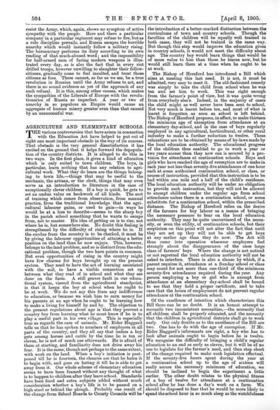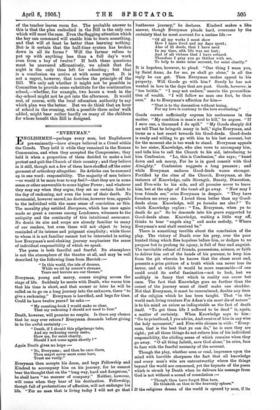AGRICULTURE AND ELEMENTARY SCHOOLS. T HE various controversies that have arisen
in connection with the Education Act have helped to put out of sight one most important obstacle in the way of its success. That obstacle is the very general dissatisfaction it has excited on the ground that it helps forward the depopula- tion of the country districts. It is alleged to do this in two ways. In the first place, it gives a kind of education which is only suited to town children. The boys, in particular, learn nothing that has any relation to agri- cultural work. What they do learn are the things belong- ing to town life,—things that may be useful to the mechanic, the artisan, or the clerk, things that may even serve as an introduction to literature in the case of exceptionally clever children. If a boy is quick, he gets to set an undue value on bookwork of all kinds. The sort of training which comes from observation, from manual practice, from the traditional knowledge that the agri- cultural labourer gains, or used to gain—in ways he would be at a loss to describe—seems to the sharp boy in the parish school something that he wants to escape from, not to master. His idea of getting on is to rise, not where he is, but somewhere else. No doubt this feeling is strengthened by the difficulty of rising where he is. If the exodus from the country is to be checked, it must be by giving the labourer opportunities of attaining a better position on the land than he now enjoys. This, however, belongs to the land problem, and so is distinct from the edu- cational problem, though the two have points in common. But even opportunities of rising in the country might have few charms for boys brought up on the present system. They need to have the act of learning associated with the soil, to have a visible connection set up between what they read. of in school and what they see done on the farm. A still graver fault in our educa- tional system, viewed from the agricultural standpoint, is that it keeps the boy at school when he ought to be at work. We do not say this from any indifference to education, or because we wish him to earn money for his parents at an age when he ought to be learning how to make a living for himself by and by. The objection to the present regulations about age is that they prevent a, country boy from learning what he must know if he is to play a useful part in his own village. This is especially true as regards the care of animals. Mr. Rider Haggard tells us that he has spoken to numbers of employers in all parts of the country, and they all say that unless a boy gets among horses and cattle by the time he is ten or eleven, he is not of much use afterwards. He is afraid of them at starting, and familiarity does not drive away his fear. It is the same; though not perhaps to the same extent, with work on the land. When a boy's initiation is post- poned till he is fourteen, the chances are that he hates it to begin with, and goes on hating it till he is able to get away from it. Our whole scheme of elementary education seems to have been framed without any thought of what is to happen to children after they leave school. Standards have been fixed and extra subjects added without much consideration whether a boy's life is to be passed on a high stool or behind the plough. Probably one result of the change from School Boards to County Councils will be the introduction of a better-marked distinction between the curriculums of town and. country schools. Though the faculties of the children will be equally well trained in both cases, they will not be trained in the same way. But though this step would. improve the education given in country schools, it would not meet the difficulty about age. The country boy would. learn things that would. be of more value to him than those he learns now, but he would still learn them at a time when he ought to , be at work.
The Bishop of Hereford has introduced a Bill which aims at meeting this last need. It is not, it must be admitted, very easy to meet it. The old-fashioned. remedy was simply to take the child from school when he was ten and set him to work. This was right enough from the farmer's point of view, but it was quite wrong from everybody else's. Indeed, in the majority of cases the child might as well never have been sent to school. Not very much is learnt before ten, and. most of what is learnt is forgotten as soon as school is left behind. The Bishop of Hereford proposes, in effect, to make thirteen the minimum age of exemption from attendance at an elementary day-school, and in the case of boys regularly employed in any agricultural, horticultural, or other rural industry to make a further reduction to twelve. These relaxations are to be obtained by means of by-laws made by the local education authority. The educational progress of the children thus enabled to go to work a year or two years sooner than they now can is secured by a pro- vision for attendance at continuation schools. Boys and. girls who have reached. the age of exemption are to make in each year not less than seventy-five attendances of one hour each at some authorised continuation school, or class, or course of instruction, provided that this instruction is to be had within one mile and a half of the child's residence. The local education authority will be under no obligation to provide such instruction, but they will not be allowed to exempt children under the regular age from school attendance unless there is a continuation school, or some substitute for a continuation school, within the prescribed distance. The Bishop of Hereford. relies on the desire of the farmers for boy labour as a means of bringing the necessary pressure to bear on the local education authority. They may be quite unconvinced. of the neces- sity, or even the utility, of continuation schools, but their scepticism on this point will not alter the fact that until they are set up they will not be able to get boys at any earlier age than they do now. The Act will thus come into operation wherever employers feel strongly about the disappearance of the once large class of farmers' boys. Where the chancre is not noticed. or not regretted the local education authority will not be asked. to interfere. There is also a clause by which, if a parent requires it, attendance at a Sunday school or class may count for not more than one-third. of the minimum seventy-five attendances required. during the year. Any person employing a boy or girl who is exempt from attendance at an elementary day-school shall be bound to see that they hold a proper certificate, and to take care that the hours of employment do not prevent regular attendance at the continuation school.
Of the excellence of intention which characterises this Bill there can be no doubt. It is an honest attempt to reconcile two inconsistent necessities,—the necessity that all children shall be properly educated, and the necessity that the children in agricultural districts shall go to work early. Our only doubts as to the excellence of the Bill are two. One has to do with the age of .exemption. If Mr. Rider Haggard's informants are right, a boy who has to look after animals ought to begin before he is twelve. We recognise the difficulty of bringing a child's regular education to an end as early as eleven, but it will be of no use to legislate for the farmer's need, and. then stop short of the change required to make such legislation effectual. If the seventy-five hours spent during the year at a continuation school up to the age of sixteen will really secure the necessary minimum of education, we should. be inclined to begin the experiment a little earlier. The other doubt relates to the physical fitness of a boy of twelve for attendance at a continuation school after he has done a day's work on a farm. We should be disposed to fear that he would be more likely to spend the school hour in so much sleep as the watchfulness of the teacher leaves room for. The probable answer to this is that the plan embodied in the Bill is the only one which will meet the case. Even the flagging attention which the boy can command will enable him to learn something, and that will at least be better than learning nothing. But is it certain that the half-time system has broken down in all its forms ? Will the farmer refuse to put up with anything less than a full day's work even from a boy of twelve ? If both these questions must be answered affirmatively, we admit that the night is the only time left for schooling ; but that is a conclusion we arrive at with some regret. It is not a regret, however, that touches the principle of the Bill. We only ask whether it might not be possible in Committee to provide some substitute for the continuation school,—whether, for example, two hours a week in the day-school might not be got into the afternoon. It would rest, of course, with the local education authority to say which plan was the better. But we do think that an hour of school in the evening, with a possible three miles' walk added, might bear rather hardly on many of the children for whose benefit this Bill is designed.
"EVERYMAN."











































 Previous page
Previous page